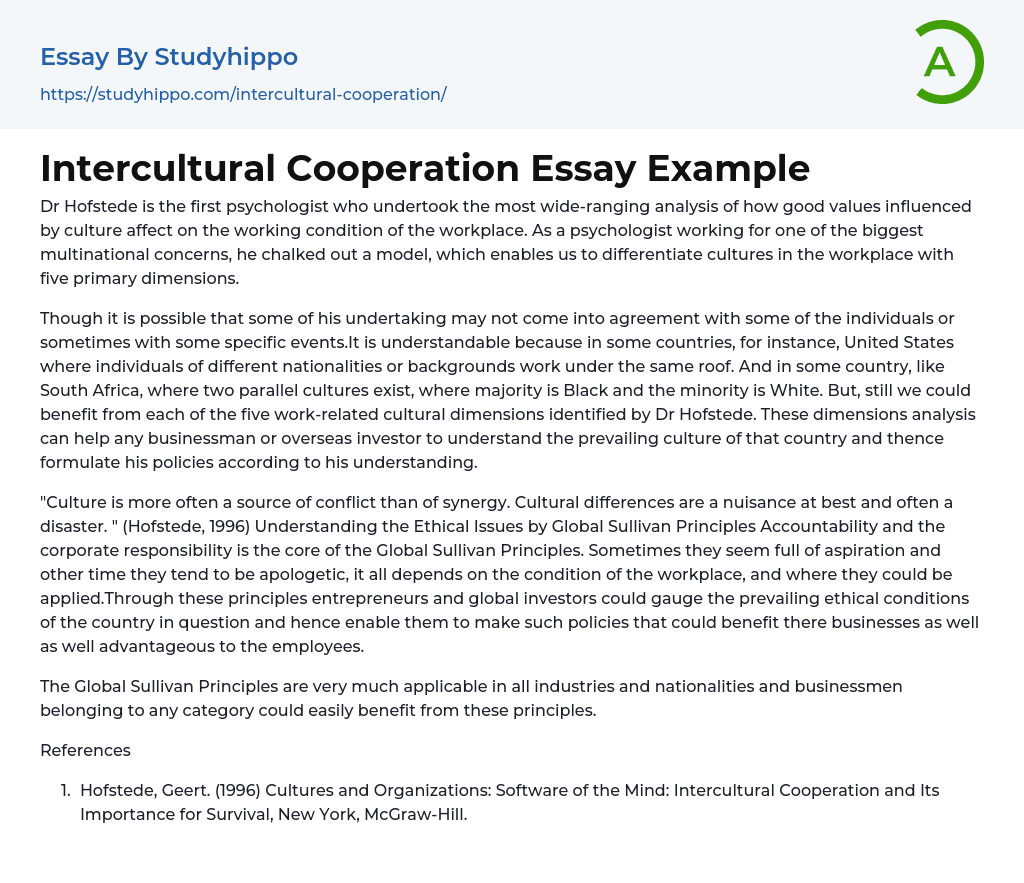Dr Hofstede is the first psychologist who undertook the most wide-ranging analysis of how good values influenced by culture affect on the working condition of the workplace. As a psychologist working for one of the biggest multinational concerns, he chalked out a model, which enables us to differentiate cultures in the workplace with five primary dimensions.
Though it is possible that some of his undertaking may not come into agreement with some of the individuals or sometimes with some specific events.It is understandable because in some countries, for instance, United States where individuals of different nationalities or backgrounds work under the same roof. And in some country, like South Africa, where two parallel cultures exist, where majority is Black and the minority is White. But, still we could benefit from each of the five work-related cultural dimensions identified by Dr
...Hofstede. These dimensions analysis can help any businessman or overseas investor to understand the prevailing culture of that country and thence formulate his policies according to his understanding.
"Culture is more often a source of conflict than of synergy. Cultural differences are a nuisance at best and often a disaster. " (Hofstede, 1996) Understanding the Ethical Issues by Global Sullivan Principles Accountability and the corporate responsibility is the core of the Global Sullivan Principles. Sometimes they seem full of aspiration and other time they tend to be apologetic, it all depends on the condition of the workplace, and where they could be applied.Through these principles entrepreneurs and global investors could gauge the prevailing ethical conditions of the country in question and hence enable them to make such policies that could benefit there businesses as well as wel
advantageous to the employees.
The Global Sullivan Principles are very much applicable in all industries and nationalities and businessmen belonging to any category could easily benefit from these principles.
References
- Hofstede, Geert. (1996) Cultures and Organizations: Software of the Mind: Intercultural Cooperation and Its Importance for Survival, New York, McGraw-Hill.
- Entrepreneur essays
- Walt Disney essays
- Henry Ford essays
- Bernie Madoff essays
- Rockefeller essays
- Bill Gates essays
- Steve Jobs essays
- Values of Life essays
- Ethical dilemma essays
- Normative Ethics essays
- Virtue Ethics essays
- Belief essays
- Deontology essays
- Moral essays
- Virtue essays
- Work Ethic essays
- Accounting essays
- Andrew Carnegie essays
- Automation essays
- Business Cycle essays
- Business Intelligence essays
- Business Model essays
- Business Operations essays
- Business Software essays
- Cooperation essays
- Cooperative essays
- Corporate Social Responsibility essays
- Corporation essays
- Customer Relationship Management essays
- Family Business essays
- Franchising essays
- Harvard Business School essays
- Harvard university essays
- Human Resource Management essays
- Infrastructure essays
- Inventory essays
- Logistics essays
- Management essays
- Manufacturing essays
- Market essays
- Marketing essays
- Multinational Corporation essays
- News Media essays
- Online Shopping essays
- Quality Assurance essays
- Richard Branson essays
- Sales essays
- Selling essays
- Shopping Mall essays
- Small Business essays




